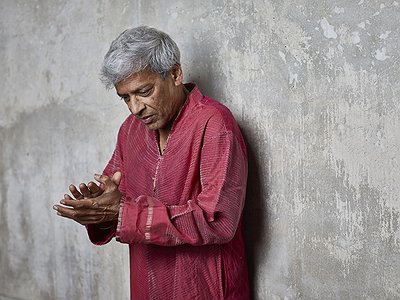Name: Trilok Gurtu
Nationality: Indian
Occupation: Percussionist, composer
Current release: Trilok Gurtu's One Thought Away, featuring collaborations with the late Robert Miles, James Hallawell and Carlo Cantini, is out via Jazzline.
If you enjoyed this interview with Trilok Gurtu and would like to know more about his music and current live dates, visit his official homepage. He is also on Instagram, and Facebook.
For the thoughts of one of his collaborators, read our Jan Bang interview.
When did you first start getting interested in musical improvisation?
At the age of 4 I started with my mother.
There were a lot of musicians coming to our home either to teach my mother of to practice. All conversation was about music and how to develop.
Which artists, approaches, albums or performances involving prominent use of improvisation captured your imagination in the beginning?
It was India.
Focusing on improvisation can be an incisive transition. Aside from musical considerations, there can also be personal motivations for looking for alternatives. Was this the case for you, and if so, in which way?
Improvisation should be a form of constant composing at the highest possible level.
What, would you say, are the key ideas behind your approach to improvisation? Do you see yourself as part of a tradition or historic lineage?
Indian music is about 90% improvised. That’s what we have been taught.
Actually, a lot of people in the West don´t know about that.
What was your own learning curve / creative development like when it comes to improvisation - what were challenges and breakthroughs?
To create a unified whole out of all cultures.
Tell me about your instrument and/or tools, please. How would you describe the relationship with it? What are its most important qualities and how do they influence the musical results and your own performance?
The first instrument is the human voice. It dictates all other instruments which are vehicles of my expression.
Can you talk about a work, event or performance in your career that's particularly dear to you? Why does it feel special to you? When, why and how did you start working on it, what were some of the motivations and ideas behind it?
All performances were dear to me. I learned something from each performance.
How do you feel your sense of identity influences your collaborations? Do you feel as though you are able to express yourself more fully in solo mode or, conversely, through the interaction with other musicians? Are you “gaining” or “sacrificing” something in a collaboration?
I feel comfortable in all formats, solo or with group. It has to be sensible improvisation in all formats.
Derek Bailey defined improvising as the search for material which is endlessly transformable. Regardless of whether or not you agree with his perspective, what kind of materials have turned to be particularly transformable and stimulating for you?
When I was playing with Joe Zawinul for example, improvisations had to make a lot of sense. You don't want to waste your time by just playing “anything”.
When you're improvising, does it actually feel like you're inventing something on the spot – or are you inventively re-arranging patterns from preparations, practise or previous performances?
I am listening and going with the flow of the music.
To you, are there rules in improvisation? If so, what kind of rules are these?
Improvisation should not be licks, because they are tricks
In a live situation, decisions between creatives often work without words. How does this process work – and how does it change your performance compared to a solo performance?
It all comes down to listening; listening both in the moment of interaction with musicians - or when you're playing a solo.
In a way, improvisations remind us of the transitory nature of life. What, do you feel, can music and improvisation express and reveal about life and death?
The audience is listening intensly and they are caught in the performance.




